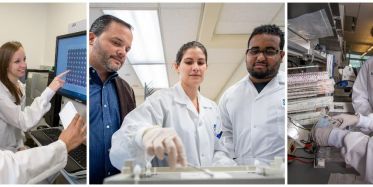Hildegund C.J. Ertl, M.D.
-
Professor, Vaccine & Immunotherapy Center
Ertl’s research centers on developing vaccines for an array of diseases and conditions—including AIDS, chronic viral infections, COVID-19 and some forms of cancer—not typically considered to be treated using this approach. These vaccines aim to protect against future infections and look to create new therapies for diseases already affecting people.
Ertl came to The Wistar Institute as an associate professor in 1987. A native of Germany, she received her medical degree from University of Göttingen. While in medical school, she began her scientific training as a student in the Max Planck Institute of Experimental Medicine. After research fellowships at the Australian National University and the University of Minnesota, Ertl joined the faculty of Harvard University before transitioning to Wistar. She became a full professor at Wistar in 1996 and holds professorships at the University of Pennsylvania School of Medicine and The Children’s Hospital of Philadelphia.
The Ertl Laboratory

The Ertl Laboratory
The Ertl laboratory has pioneered numerous patented technologies to create new vaccines. Much of the laboratory’s efforts focus on developing a new preventative vaccine for rabies—a lethal and underestimated disease that remains a top public health priority across the globe—have yielded useful technologies that the Ertl laboratory is applying to combating other viruses.
The lab is applying its adenovirus vaccine expertise against SARS-CoV-2, utilizing a modified chimpanzee virus as a vaccine delivery vehicle to induce an immune response. They are applying this platform to develop HIV vaccines and creating new therapeutic vaccines against human papillomavirus (HPV), a leading cause of cervical cancer, and chronic hepatitis B virus infection, a major cause of hepatocellular carcinoma.
-
Senior Staff Scientists
Zhi Quan Jason Xiang, M.D.
Xiang Yang Peter Zhou, M.D., Ph.D. -
Postdoctoral Fellows
Mohadeseh Hasanpourghadi, Ph.D.
Mohsen Mohammadi, Ph.D. -
Wistar Research Assistants
Wynetta Giles-Davis
Amara Saha -
Lab Coordinator
Christina Cole
Research
Vaccines to SARS-COV-2
We developed vaccines expressing the SARS-CoV-2 spike or nucleocapsid protein. The vaccines are being tested for T and B cell responses in mice. They are being tested in a hamster challenge model.
Therapeutic Cancer Vaccine to Human Papilloma Virus
Vaccines that aim to expand tumor-specific CD8(+) T cells have yielded disappointing results in cancer patients although they showed efficacy in transplantable tumor mouse models. Using a system that more faithfully mimics a progressing cancer and its immunoinhibitory microenvironment, we show that in transgenic mice, which gradually develop adenocarcinomas due to expression of HPV-16 E7 within their thyroid, a highly immunogenic vaccine expressing E7 only induces low E7-specific CD8(+) T-cell responses, which fail to affect the size of the tumors.
In contrast, the same type of vaccine expressing E7 fused to herpes simplex virus (HSV)-1 glycoprotein D (gD), an antagonist of the coinhibitory B- and T-lymphocyte attenuator (BTLA)/CD160-herpes virus entry mediator (HVEM) pathways, stimulates potent E7-specific CD8(+) T-cell responses, which can be augmented by repeated vaccination, resulting in initial regression of even large tumor masses in all mice with sustained regression in more than half of them. These results indicate that active immunization concomitantly with blockade of the immunoinhibitory HVEM-BTLA/CD160 pathways through HSV-1 gD may result in sustained tumor regression.
HIV-1 Vaccine Based on Chimp Serotypes of Adenovirus
This NIH-funded research aimed to test adenoviral recombinants based on simian serotypes for induction of immune responses to gag/pol/rev/env of HIV-1 or SIV-1 in mouse and primate models. Results were promising and part of the vaccines, based on two adenoviral vector vaccines expressing the HIV-1 env protein, are currently being tested in a phase I trial sponsored by HVTN.
Genetic Vaccine to Rabies Virus
The laboratory developed an adenovirus-based vaccine against rabies virus that can provide rapid immunity following a single administration. A simian adenoviral vector termed adenovirus C68 (AdC68) was generated as a molecular clone to express the glycoprotein of rabies virus. In mice, this vector induced complete protection to rabies virus challenge after a single dose. This vaccine also achieves long-term protection in non-human primates after a single dose. A slightly modified version of this vaccine has been tested in collaboration with The University of Oxford. Results were promising and a phase 1b/II trial is being initiated.
Therapeutic HBV Vaccine Based on Chimp Serotypes of Adenovirus
In collaboration with Virion Therapeutics, the laboratory developed a therapeutic vaccine against chronic hepatitis B virus (HBV) infection (CHB). The vaccines target viral polymerase and core proteins. Vaccines are delivered by chimpanzee adenovirus vectors (AdC) of serotype 6 (AdC6) and 7 (AdC7) used in prime-only or prime-boost regimens. The HBV antigens are fused into an early T cell checkpoint inhibitor, i.e., herpes simplex virus (HSV) glycoprotein D (gD), which enhances and broadens vaccine induced CD8+ T cell responses. The vaccines were shown to induce potent CD8+ T cells in mice which can reduce HBV viral loads in a surrogate model of CHB. Clinical trials are planned and expected to commence towards the end of 2022.
Metabolic Manipulation of CD8+ T Cells to Enhance Their Ability to Delay Tumor Progression
Reducing the metabolic stress within a tumor microenvironment could be essential to improve the effectiveness of active cancer immunotherapy. Using a mouse model of melanoma, the laboratory showed that appropriately timed treatment with the PPAR agonist fenofibrate improves the ability of a T cell-inducing cancer vaccine to delay tumor progression. The drug reduces the use of glucose by tumor and tumor stroma cells and promotes the use of fatty acids for their metabolic needs. The increased availability of glucose within the tumor microenvironment in turn allows for its increased use by vaccine-induced tumor-infiltrating CD8+ T cells, which improves their ability to slow tumor progression. The laboratory is currently using a humanized mouse model to test if similar results can be obtained with human melanomas.
Ertl Lab in the News
Selected Publications
Immunological Biomarker Discovery in Cure Regimens for Chronic Hepatitis B Virus Infection.
Gehring, A.J., Mendez, P., Richter, K., Ertl, H., Donaldson, E.F., Mishra, P., Maini, M., Boonstra, A., Lauer, G., Creus, A., et al. “Immunological Biomarker Discovery in Cure Regimens for Chronic Hepatitis B Virus Infection.” J Hepatol. 2022 Mar 5;S0168-8278(22)00127-1. doi: 10.1016/j.jhep.2022.02.020.
The Effect of Rapamycin and Ibrutinib on Antibody Responses to Adeno-associated Virus Vector-mediated Gene Transfer.
Xiang, Z., Kuranda, K., Quinn, W., Chekaoui, A., Ambrose, R., Hasanpourghadi, M., Novikov, M., Newman, D., Cole, C., Zhou, X., et al. “The Effect of Rapamycin and Ibrutinib on Antibody Responses to Adeno-associated Virus Vector-mediated Gene Transfer.” Hum Gene Ther. 2022 Mar 1. doi: 10.1089/hum.2021.258. Online ahead of print.
Hepatitis B Virus Polymerase-specific T cell Epitopes Shift in a Mouse Model of Chronic Infection.
Hasanpourghadi, M., Novikov, M., Newman, D., Xiang, Z., Zhou, X.Y., Magowan, C., Ertl, H.C.J. “Hepatitis B Virus Polymerase-specific T cell Epitopes Shift in a Mouse Model of Chronic Infection.” Virol J. 2021 Dec 7;18(1):242. doi: 10.1186/s12985-021-01712-y.
PPARα Agonist Fenofibrate Enhances Cancer Vaccine Efficacy.
Chekaoui, A., Ertl, H.C.J. “PPARα Agonist Fenofibrate Enhances Cancer Vaccine Efficacy.” Cancer Res. 2021 Sep 1;81(17):4431-4440. doi: 10.1158/0008-5472.CAN-21-0052. Epub 2021 Jul 8.
COVID-19 Vaccines Based on Adenovirus Vectors.
Hasanpourghadi, M., Novikov, M., Ertl, H.C.J. “COVID-19 Vaccines Based on Adenovirus Vectors.” Trends Biochem Sci. 2021 May;46(5):429-430. doi: 10.1016/j.tibs.2021.03.002.


